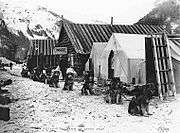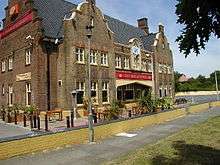Roadhouse (facility)
.jpg)
A roadhouse (US), stopping house (Canada) or coaching inn (GB) is a commercial establishment typically built on or near a major road or highway that services passing travellers. The word's meaning varies slightly by country.
Western Canada
In Western Canada the equivalent facility was historically called a stopping house.
United States
A local inn or restaurant, the "roadhouse" or "road house" commonly serves meals, especially in the evenings; has a bar serving beer or hard liquor and features music, dancing, and sometimes gambling. Most roadhouses are located along highways or roads in rural areas or on the outskirts of towns. Early roadhouses provided lodging for travelers but, with the advent of faster means of transport than walking, horseback riding, or horse-drawn carriages, few now offer rooms to let. Roadhouses have a slightly disreputable image, similar to honky tonks.
This type of roadhouse has been portrayed in movies such as The Wild One, Easy Rider, and Road House.

Alaska and the Yukon
From the 1890s in Alaska and the Yukon, beginning with the gold rush,[1] roadhouses were checkpoints where dog drivers (mushers, or dog sledders); horse-driven sleds; and people on snowshoes, skis, or walking would stop overnight for shelter and a hot meal. Remains of a roadhouse can be seen today south of Carmacks, Yukon along the Klondike Highway.[2]
Australia

In Australia a roadhouse is a full-service station in a rural area but located on a major intercity route. A roadhouse sells fuel and provides maintenance and repairs for cars, but it also has an attached "restaurant" (more like a café or diner) to sell and serve hot food to travellers. Roadhouses usually also serve as truck stops, providing space for parking of semi-trailer trucks and buses, as well as catering to travellers in private cars. In remote areas such as the Nullarbor Plain, a roadhouse also offers motel-style accommodation and camping facilities.
Britain

Roadhouses in Britain were called coaching inns. Like roadhouses in other countries, they were originally a place along the road for people travelling on foot or by horse to stay at night, but today they are often restaurants or pubs without lodging. However, many coaching inns, especially those in rural counties, have kept their accommodation to become bed & breakfasts or country hotels. With the advent of popular travel by motor car in the 1920s and 1930s, a new type of roadside pub emerged, often located on the newly constructed arterial roads and bypasses. They were large establishments offering meals, refreshment and accommodation to motorists and parties travelling by charabanc. The largest pubs boasted facilities such as tennis courts and swimming pools. Their popularity ended with the outbreak of the Second World War when recreational road travel became impossible, and the advent of post-war drink driving legislation prevented their full recovery.[3]
Spain
Post houses (casas de postas) were established in major towns and along principal highways. Post masters provided fresh horses, and sometimes carriages and over-night accommodation for use by Royal officers called Postillones who were uniformed guides authorised to conduct passengers, goods and messages along specific routes.[4]
In popular culture
- "Roadhouse Blues," a song by The Doors
- Road House, a 1989 movie about a bouncer, starring Patrick Swayze.
See also
- Rest area
- Charging station
- Fast food restaurant
- Black Rapids Roadhouse, an old Alaskan roadhouse
- List of public house topics
- Rika's Landing Roadhouse
- Service station
References
- ↑ Historic Roadhouses Along the Yukon
- ↑ The Rapids Roadhouse: History, Black Rapids website
- ↑ Gutzke, David W (2005). "Improved Pubs and Road Houses: Rivals for Public Affection in Interwar England". www.breweryhistory.com. The Brewery History Society. Retrieved 3 April 2016.
- ↑ from the latest collections of Juan de la Reguera y Valdelomar, (Google book, in Spanish)